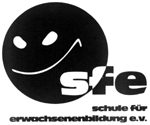Hosts
The Netzwerk Spiel/Kultur (network for play/culture) and KRÄTZÄ
The network has its roots in the '80s. Under the headings "City as playground" and "Equal rights instead of division by age" it offers children many opportunities to play, to become involved and to learn.
Since the beginning of the '90s KRÄTZÄ, the children's rights group, has belonged to the Spielkultur network. It stands for equal rights between children and adults, and justifies this by appealing to human rights, which are valid for every human being, regardless of age. Since its foundation KRÄTZÄ has been working for changes in the school system. Its criticism of German schools has led the young people to many schools which can be taken as models for change: the SchülerInnenschule in Vienna, various schools in Denmark, Summerhill and Sands School in England and most recently Hadera, Kanaf and Keshet schools in Israel. In 2003 the group even visited Sudbury Valley School in the USA, in conjunction with their attendance at the 2003 IDEC. When we have come back to Germany we have always reported on our impressions.
For years we have been particularly familiar with schools of the Sudbury type from sources which our fellow-campaigner Martin Wilke has translated into German.
Since 1990 the association has been promoting the foundation of the first East Berlin alternative school, and is now supporting a steering group for a Sudbury School in Berlin.
We have experience in public relations and in working with the press. For years we have been tried and tested in fund-raising. In 1996 we organised a conference on the theme of "Equal Rights Regardless of Age" with participants from Nicaragua and Honduras.
Since 1996 we have managed a steadily growing website on which, among other things, you can find pages in six languages: → http://www.kraetzae.de/. On the German pages there is a long historical account of our work.
Die Schule für Erwachsenenbildung.

The Schule für Erwachsenenbildung (SfE) is an independent, non-hierarchical school of adult education that prepares its mature (18+) secondary-school pupils for the externally administered state Abitur (A-level) and Mittlere Reife (O-level) examinations. Founded in 1973 at the height of the so-called "autonomous student movement", the SfE is today the only secondary school in Germany to be organized according to the principles of democratic self-government and self-determined learning.
The school is dedicated to the principles of equality and diversity, and many of its members engage themselves politically in the struggles against racism, sexism, antisemitism and homophobia. Financially, the SfE is entirely self-supporting, all of its running expenses (rent, salaries, etc.) being covered by the tuition fees paid by the students. However, in deference to the needs of students from economically disadvantaged backgrounds and in accordance with its status as a non-profit institution, these fees are kept as low as possible and, like all other matters of school policy, are set democratically by the collective of students, teachers and office staff. At present, the school has approximately 300 students (divided into 12 classes), 13 teachers and an administrative staff of four.
(→ http://sfeberlin.de/)
Group photo

The steering group
